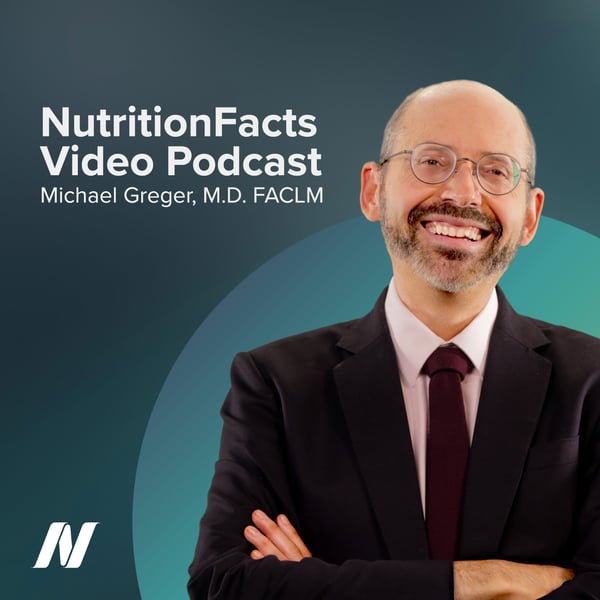There’s a Fly in My Aging Research!
NutritionFacts.org Video Podcast
[email protected]
4.8 • 877 Ratings
🗓️ 25 September 2024
⏱️ 5 minutes
🧾️ Download transcript
Summary
Transcript
Click on a timestamp to play from that location
| 0:00.0 | There are numerous ways to try to unlock the mysteries of aging. |
| 0:11.0 | You could study long-lived individuals like centenarians and super-sentenarians, particularly |
| 0:17.0 | long-lived smokers, perhaps, to uncover the secrets to their resilience. |
| 0:22.1 | Or you could go in the opposite direction and study short-lived to people. |
| 0:25.9 | Tragic, accelerated aging syndromes like progeria, where children age at eight to ten times |
| 0:31.8 | at normal rate, wrinkling, balding, and then typically dying around age 13 of a heart attack or stroke. |
| 0:38.3 | Or you could study long-lived animals. |
| 0:40.3 | There are mammals such as the bowhead whale that can live hundreds of years. |
| 0:44.3 | There are oysters and clams whose hearts can beat over a billion times over its five-century |
| 0:50.3 | lifespan. |
| 0:52.3 | What accounts for the 10,000-fold range of lifespan in the animal kingdom? |
| 0:57.0 | Most of the aging pathways identified as the hallmarks of aging were established using |
| 1:03.0 | so-called model organisms, such as yeast, worms, flies, and mice, simpler species |
| 1:08.0 | that may nonetheless offer insights due to the remarkable conservation |
| 1:12.2 | of common aging mechanisms through the eons of evolutionary time. |
| 1:17.3 | Aging used to be considered simply too complex to study, a constellation of internal and external |
| 1:23.3 | influences too complicated to disentangle. |
| 1:26.8 | But then the game-changer. |
| 1:29.3 | The discovery that a single gene mutation could dramatically prolong the lifespan and |
| 1:35.3 | youthful state of a tiny worm known as C. Elegans. |
| 1:40.3 | Sea Elegans has since wormed its way deep into the study of longevity. It seems we shared a common ancestor about half billion years ago, and to this day we still share |
| 1:50.0 | about half their genes. |
... |
Please login to see the full transcript.
Disclaimer: The podcast and artwork embedded on this page are from [email protected], and are the property of its owner and not affiliated with or endorsed by Tapesearch.
Generated transcripts are the property of [email protected] and are distributed freely under the Fair Use doctrine. Transcripts generated by Tapesearch are not guaranteed to be accurate.
Copyright © Tapesearch 2025.

